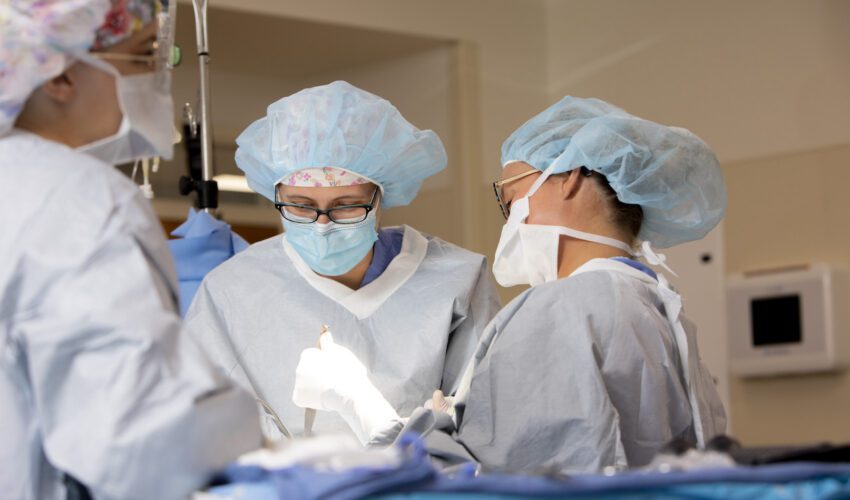What’s new in breast cancer care?
Dec. 27, 2022
This paid piece is sponsored by Avera Health.
After a breast cancer diagnosis, women know what they want: the best outcome so they can continue making memories with the ones they love. But when it’s time to talk treatment, there’s also room to potentially reduce toxicity and side effects through the newest options in breast cancer treatment.
“Avera is on the leading edge of cancer treatments,” said Dr. Ally Higgins, a breast oncologist at Avera Medical Group Oncology & Hematology Sioux Falls. “We work to help patients survive and thrive with new medications, shorter treatment windows and better methods to prevent recurrence.”
Dr. Michelle Bryan, Ph.D., an Avera Medical Group breast surgeon, works with her team during a breast procedure.
New innovations in breast cancer care
Immunotherapy: An impressive step forward in innovation, immunotherapy trains the patient’s own immune system to identify and fight breast cancer cells. This drives long-term survival as the body now has greater ability to fight the mutated cells of the cancer. If you have lumpectomy or mastectomy surgery, immunotherapy may be utilized to prevent recurrence.
“Immunotherapy not only changes the game when patients are in the earlier stages of breast cancer,” said Dr. John Lee, FACS, chief medical officer for cancer research for Avera Cancer Institute. “It’s also FDA-approved to benefit patients facing stage 4 metastatic breast cancer.”
Tumor sequencing: A genetic test of the breast cancer’s DNA can reveal which existing cancer treatments would effectively treat that patient’s breast cancer. What’s interesting about precision oncology is that a medication commonly used for lung or colon cancer could prove radically effective for that particular patient.
“Through Avera’s collaboration with partners, all patients diagnosed with cancer are offered genomic testing to guide the possible course of treatment,” Lee said.
Intraoperative radiation therapy: During lumpectomy surgery, IORT delivers radiation pinpointed to the tumor. This can shorten or eliminate post-surgery radiation treatments. It also gives more women the option of lumpectomy, which conserves the breast.
“This relatively new treatment came to Avera as a clinical trial, and while the efficacy and safety is still being investigated in certain breast cancers, like many treatments that were brought in as a trial, the therapy is now regularly used for certain early-stage breast cancer cases,” Lee said.
Estrogen-reducing medications: Nearly 75 percent of breast cancers are fueled by estrogen. Medications such as tamoxifen and aromatase inhibitors have been available for decades to block estrogen to treat breast cancers or prevent breast cancer recurrence after surgery. Recently, CDK4/6 inhibitors have been developed to help these standard estrogen blockers work better and longer. Newer estrogen blockers such as oral selective estrogen receptor degraders are being studied in clinical trials, some of which are available at Avera Cancer Institute.
SAVI Scout: A rice-sized electronic device is inserted into the tumor site as a marking for the breast surgeon. When the time of surgery arrives, the surgeon locates the marked tumor and removes it. This is more comfortable for women than having an exterior wire to mark the tumor.
Clinical trials
Clinical trials, which are the implementation of cancer treatment methods currently under study, are incredibly important. With the help of willing participants, clinical trials bring the “future of health care” to the present. These results pave the way for other cancer patients receiving effective treatment.
The new drugs work in tandem with standard measures such as chemotherapy, radiation and surgery. Many are designed to reduce estrogen, which cuts off the tumor’s fuel. Other clinical trial drugs go right in to destroy the tumor.
A very important innovation in breast cancer treatment is the development of antibody-drug conjugates, which deliver chemotherapy directly to the cancer cells. Some of these new treatments already have been approved, but several are still being studied. Clinical trials are available at Avera Cancer Institute.
“I strongly encourage patients to ask about what treatments are available to them, including clinical trials,” Higgins said. “We appreciate each and every patient who participates in clinical trials and hope that it not only benefits their cancer care but also future patients’ cancer care.”
New cancer treatments benefit patients
Advancements in cancer treatment allow physicians to:
- Systemically target and destroy cancer cells.
- Perform fewer surgeries, leading to fewer complications.
- Prescribe less radiation over a shorter course of time.
- Alleviate cancer treatment side effects, including nausea and hair loss.
- Help patients achieve a more ideal outcome for their case.
“Today, we have the capability to improve survivorship as well as increase the comfort and experience of our patients facing breast cancer,” Lee said.
If you’re receiving cancer care at an Avera facility outside of Sioux Falls, talk to your care team about clinical trials. Avera’s Sioux Falls cancer team can work closely with you and your care team to see what clinical trials can be administered to you locally.
Learn more about Avera’s dedication to cancer research.








